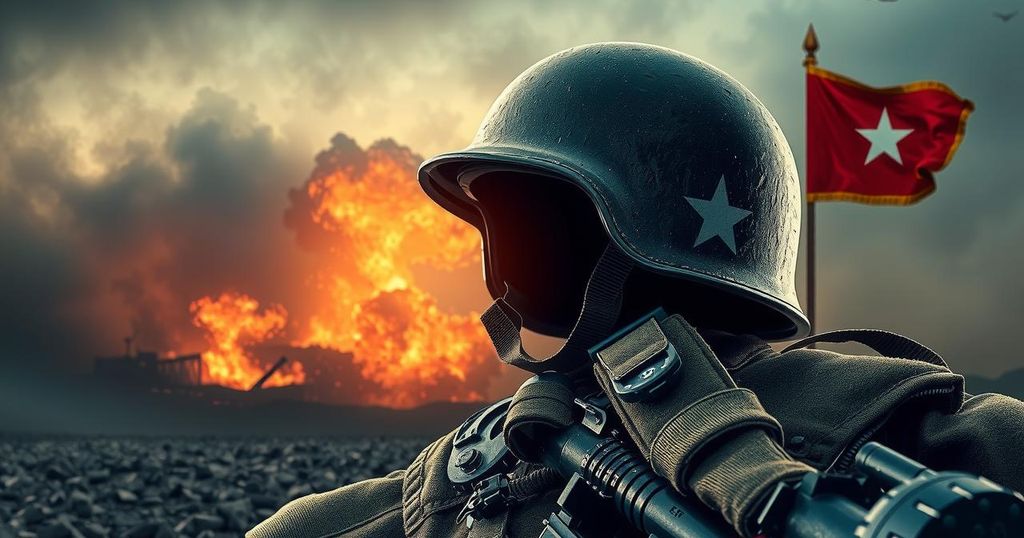North Korean soldiers have largely disappeared from the battlefield in Ukraine, with significant casualties reported among the estimated 12,000 sent to support Russian troops. While some reports suggest their effectiveness, Ukrainian forces have noted high casualty rates and lack of combat experience. Recent captures of North Korean POWs reveal fears of reprisals motivating some soldiers to take drastic measures. The situation underscores the complexities of military alliances and combat challenges in the conflict.
In recent months, North Korean soldiers fighting alongside Russian troops in Ukraine have largely disappeared. Colonel Oleksandr Kindratenko of the Ukrainian Special Operations Forces reported a lack of recent sightings, especially as Russia attempts to regain territory in the Kursk region after Ukraine’s surprise assault last summer. North Korean leader Kim Jong Un reportedly sent approximately 12,000 soldiers to aid Russian efforts, with estimates indicating that around half of them may have been killed or injured, though these figures remain unverifiable.
Mixed reports have emerged regarding the North Korean troops’ combat effectiveness. While some refer to them as “cannon fodder,” others highlight their discipline and proficiency with weapons. Intelligence suggests that these elite forces were deployed in mass infantry assaults, resulting in high casualty rates. Additionally, they lack experience in drone warfare, rendering them less effective in Ukraine’s technologically advanced battlefield.
Ukrainian forces have captured at least two North Korean prisoners of war, with one soldier expressing a desire to stay in Ukraine. Reports indicate that some North Korean troops have committed suicide to evade capture, fearing reprisals against their families. The first captured soldier received medical assistance after being extracted from a minefield under heavy Russian artillery fire, which demonstrated the high-stakes environment surrounding these engagements.
Prior to their decline in presence, North Korean soldiers were primarily tasked with holding specific positions in Kursk, facing substantial casualties early in their assaults. They often approached attacks along the same routes, suffering losses from previous engagements. Colonel Kindratenko noted that many soldiers operated without essential protective gear, relying solely on ammunition supplies while lacking cold-weather clothing.
Analysis of the equipment recovered from deceased North Korean soldiers suggests that they were often better armed than their Russian counterparts. North Korean troops reportedly carried modernized versions of Russian weaponry, including the AK-12 assault rifle, along with a significant amount of ammunition. The absence of acknowledgment from both Moscow and Pyongyang regarding North Korean casualties remains notable.
Ukrainian President Volodymyr Zelensky has suggested that additional North Korean fighters may be captured in the future, but it remains uncertain when they will return to combat. There is potential for reinforcements to re-enter the battlefield, possibly after further training or participating in alternative military strategies.
The involvement of North Korean soldiers in the Russia-Ukraine conflict underscores the complex dynamics of international military alliances. North Korea’s support for Russia reflects a mutual strategic interest, especially under Kim Jong Un’s regime. The deployment of these troops, however, raises questions regarding their combat readiness and effectiveness. Recent reports indicate high casualty rates among North Korean forces, alongside concerns about their treatment and morale under the harsh conditions of warfare in Ukraine. This situation illustrates the broader implications of geopolitical alliances and military engagements in contemporary conflicts.
The involvement of North Korean soldiers in the ongoing conflict in Ukraine highlights both the challenges of warfare and the evolving nature of military alliances. With substantial casualties reported among these troops and varying opinions on their effectiveness, their fate remains a crucial aspect of the conflict. The potential for further deployments or future POWs raises significant questions about the long-term consequences of North Korea’s military aid to Russia and its implications for regional stability.
Original Source: www.newsweek.com




